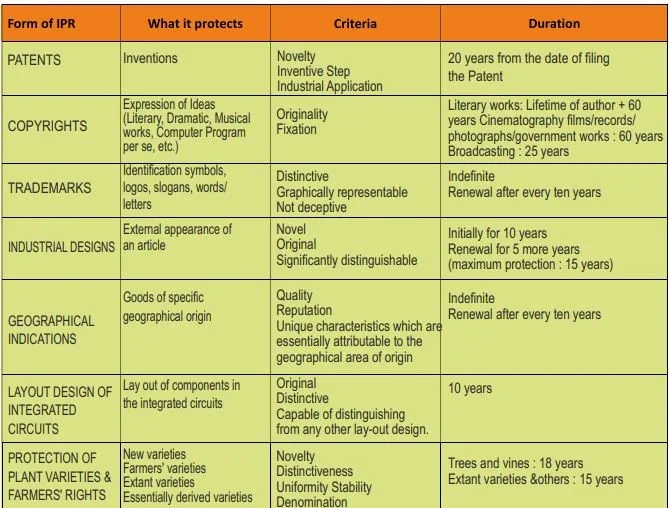Syllabus: GS3/Science and Technology
Context
- The Intellectual Property Rights (IPR) Policy of Kerala is set to undergo a thorough overhaul after a gap of 17 years.
About
- The Kerala State Council for Science, Technology and Environment (KSCSTE) has constituted a six-member drafting committee headed by Chairman, Kerala State Biodiversity Board, for preparing the revised policy.
- Kerala had first formulated an IPR policy in 2008, which will now undergo comprehensive revision.
Key Highlights
- The National IPR Policy 2016, and a 2024 direction by the Centre’s Department of Science and Technology to the States to prepare State-level policies in line with the national policy has necessitated the revision.
- The draft policy recommends, the inclusion of IPR in school and university curricula as a mandatory subject.
- The establishment of an IPR Academy and a Kerala Traditional Knowledge Authority, the creation of a Traditional Knowledge Docketing System and a ‘Mission IPR’ for the IP administration of the State are other highlights of this draft.
Intellectual Property (IP) Rights
- Intellectual Property (IP) is generally defined as the ‘Product of Mind’.
- It is a property that results from the creations of intellect in industrial, scientific, literary or artistic fields.
- Intellectual Property Right (IPR) is the legally enforceable exclusive right granted to the owner of the intellectual property for a limited period.
- IPR rewards creativity & human endeavor which fuel the progress of humankind.
- Forms of IPR : Patents, Copyrights, Trademarks, Industrial Designs, Geographical Indications, Layout Design of Integrated Circuits, Protection of Plant Varieties & Farmers’ Rights, Protection of undisclosed information/ Trade Secrets.

Is an Indian Patent valid in other Countries?
- No. Patent rights are territorial rights, which will be valid within the territory of the Country which has issued Patent.
- Hence, an Indian Patent, which is granted by the Indian Government, will be valid only in India.
| Patent Co-operation Treaty (PCT): – Patent Laws differ from Country to Country and there is nothing like “World Patent” or “International Patent”. However, there is an international filing system known as Patent Cooperation Treaty (PCT) system. – When a PCT application is filed, an inventor of a member country of PCT can simultaneously obtain priority for his/her invention in all the PCT member countries. – India joined PCT in 1998. – All activities related to PCT are coordinated by the World Intellectual Property Organization (WIPO) situated in Geneva. World Intellectual Property Organization (WIPO) – It is a self-funding agency of the United Nations, that serves the world’s innovators and creators, ensuring that their ideas travel safely to the market and improve lives everywhere. – History: WIPO was established in 1967 by the WIPO Convention. – Members: The organization has 193 member states including both developing and developed nations like India, Italy, Israel, Austria, Bhutan, Brazil, China, Cuba, Egypt, Pakistan, the U.S. and the U.K. 1. India joined WIPO in 1975. – Headquarters: Geneva, Switzerland. |
Challenges in India’s IP Regime
- Patent Backlog: Despite increasing filings, patent examination and grant delays remain a significant issue.
- IP Infringement: Weak enforcement mechanisms, leading to rampant counterfeiting and piracy.
- Low Patent Commercialization: Many patents filed in India do not get commercialized due to lack of industry-academia collaboration.
- Global Competitiveness: India’s innovation is dominated by foreign applicants, reflecting low domestic R&D investments.
India’s initiative
- National IPR Policy 2016 encompassing all IPRs into a single vision document setting in place an institutional mechanism for implementation, monitoring and review of IP laws.
- The policy encourages innovation and creativity by providing stronger protection and incentives for inventors, artists, and creators.
- Cell for IPR Promotion and Management (CIPAM): It has been set up to coordinate the implementation of the National IPR Policy.
- National Intellectual Property Awareness Mission (NIPAM), a flagship program to impart IP awareness and basic training in educational institutes.
- Scheme for Facilitating Startups Intellectual Property Protection(SIPP): It is introduced to foster innovation and entrepreneurship by providing a supportive ecosystem for startups to protect and manage their IP assets.
- Atal Innovation Mission (AIM): It was set up by NITI Aayog in 2016 to promote a culture of innovation and entrepreneurship in India. AIM has created four programs to support these functions:
- Atal Tinkering Labs
- Atal Incubation Centers
- Atal New India Challenges and Atal Grand Challenges
- Mentor India.
Concluding remarks
- India’s impressive IP growth, marked by significant advancements in patents, industrial designs, and trademarks, underlines its commitment to fostering innovation and reinforcing its global economic presence.
- This momentum supports India’s broader goals of economic expansion and innovation-driven development.
Source: TH
Previous article
Electronics Manufacturing
Next article
News In Short-21-04-2025